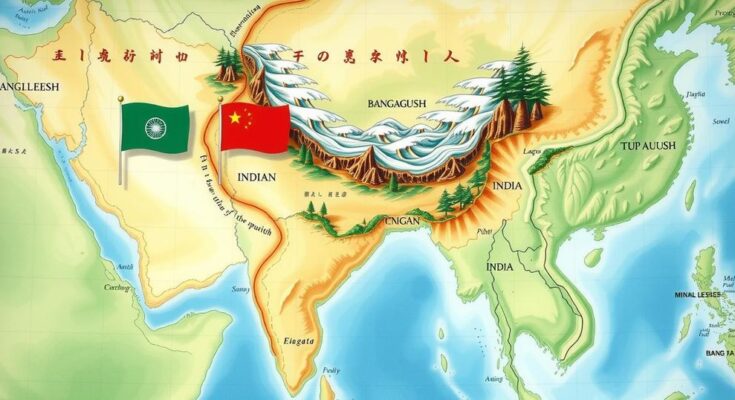Muhammad Yunus, Bangladesh’s Chief Advisor, will visit China, potentially strengthening ties amid rising India concerns. China’s “String of Pearls” strategy aims to encircle India through military bases. Yunus’ defense agreements with China, coupled with prior accusations against Bangladesh regarding minority persecution, may escalate regional tensions.
Muhammad Yunus, the Chief Advisor to Bangladesh’s Interim Government, is scheduled to visit China, marking his first trip since taking office in August 2024. His visit comes shortly after a 21-member delegation returned from China. Yunus will attend the Boao Forum for Asia and is expected to meet with Chinese President Xi Jinping on March 28, 2025, to discuss enhancing bilateral relations amid rising concerns in India regarding Bangladesh’s alignment with China.
This meeting occurs in a context of escalating tensions, as India has recently raised concerns about the treatment of minorities in Bangladesh at the United Nations Human Rights Council. Following the political upheaval that forced former Prime Minister Sheikh Hasina to flee to India, issues regarding minority persecution have garnered international attention. Hundreds of Hindus reportedly faced violence, and India expressed its worries over the situation during diplomatic discussions.
Additionally, political analysts suggest that Yunus’s visit to China may exacerbate India’s concerns about its neighbors’ growing closeness. Some experts argue that China’s strategic approach, known as the “String of Pearls,” aims to encircle India by establishing a network of military bases and ports throughout the Indian Ocean.
The String of Pearls strategy highlights China’s ambitions to enhance its naval presence, with significant developments in countries like Pakistan, Sri Lanka, and Myanmar. As Bangladesh strengthens its defense ties with China, further cooperation may include weapons acquisitions and military agreements that pose potential challenges for India, especially considering the conclusion of the landmark Defense Cooperation Agreement signed in 2002.
The evolving relationship between Bangladesh and China, amid Bangladesh’s efforts to modernize its armed forces with Chinese support, could represent a shift in regional power dynamics, raising strategic alarm for New Delhi.
In summary, Muhammad Yunus’ forthcoming visit to China signifies a potential strengthening of ties between Bangladesh and the Chinese government. With concerns mounting in India about this relationship and the implications of the “String of Pearls” strategy, the evolving geopolitical landscape in South Asia may witness significant changes. The enhancement of defense cooperation between Bangladesh and China could heighten tensions and further affect regional stability, especially given recent accusations against Bangladesh regarding minority treatment.
Original Source: www.dnaindia.com




